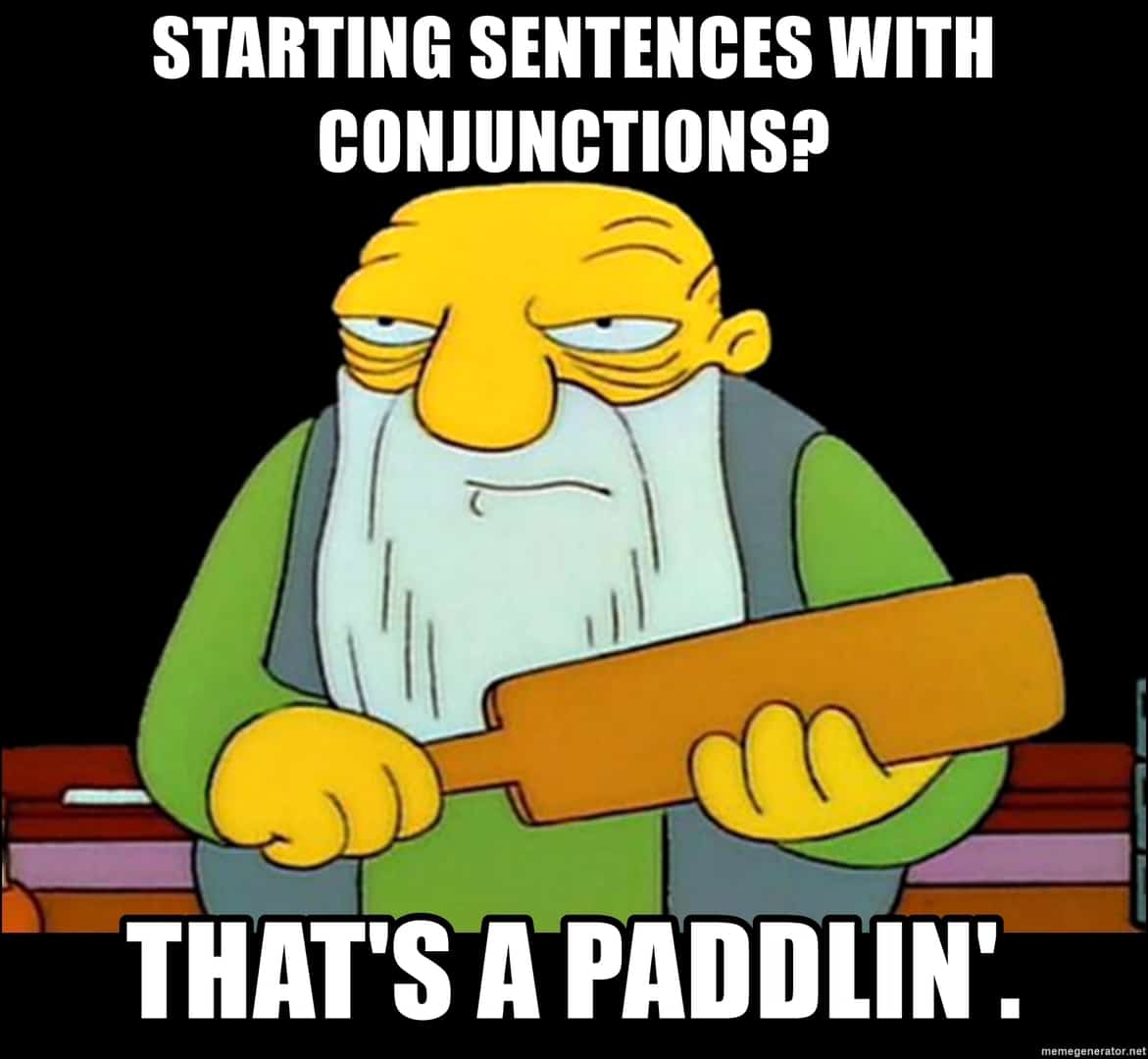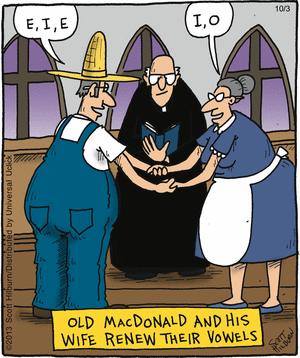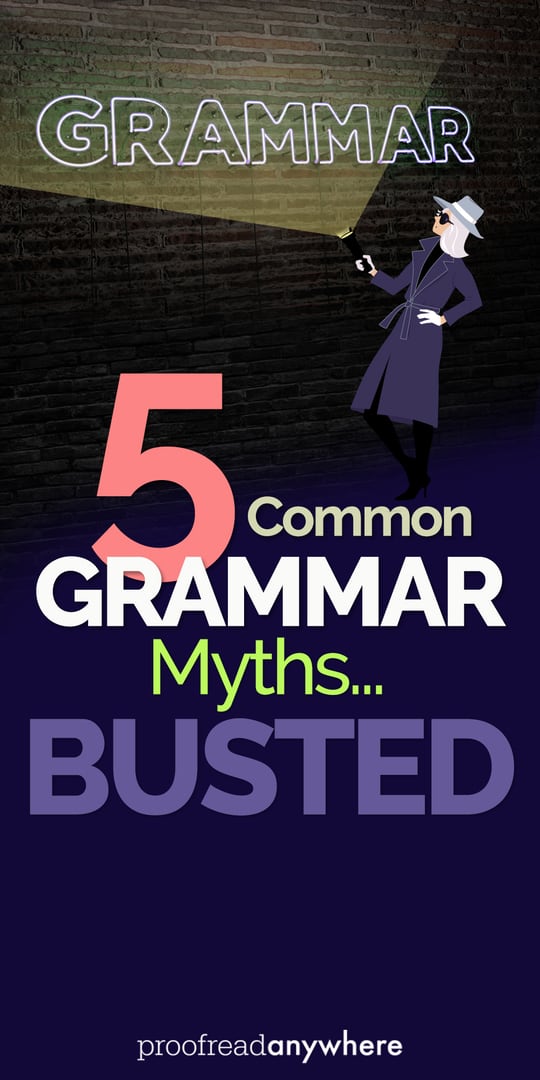Chances are, if you’re reading this blog, you have an interest in grammar and want to speak/write correctly. Despite your best intentions, you may be holding on to some outdated grammar “rules” that were forced down your throat in school.
Some of these rules have changed with the times; others were never rules to begin with!
Here are five super common grammar myths you can let go of right now!
Myth #1: You should never end a sentence with a preposition
The rumor that you should never end a sentence with a preposition was started by a seventeenth-century English writer named John Dryden, who had a fascination with Latin. In Latin grammar, prepositions must always come before their object, but the same is not true of English grammar.
Winston Churchill famously said, “That is the type of arrant pedantry up with which I shall not put.” And I have to agree with him!
Compare these two sentences:
Awkward: Is that the book about which you were talking?
Better: Is that the book you were talking about?
Ending a sentence with a preposition sounds much more natural than the awkward rephrasing that occurs when you try to avoid it.
It’s time to let this myth go!

Source: Pinterest
Myth #2: You should never split infinitives
According to this “rule,” you shouldn’t split the word to from its verb (i.e., you should not place an adverb or adverbial phrase between to and the verb).
But if we followed this rule, we’d end up with horrendous sentences like…
“To go boldly where no man has gone before.”
Rather than the iconic sentence we’re all familiar with…
“To boldly go where no man has gone before.”
Doesn’t quite have the same ring to it, does it?
Sometimes it’s perfectly okay to split an infinitive to add emphasis or sound more natural. Go for it!

Source: Tumblr
Myth #3: You should never start a sentence with a conjunction
If you’re a regular reader of my blog, you’ve probably noticed that I break this “rule” all the time!
A lot of people think it’s wrong to start a sentence with a conjunction like for, and, nor, but, or, yet, so, etc. (easy to remember acronym = FANBOYS).
This belief has NO grammatical or historical foundation! In fact, according to the Chicago Manual of Style, a substantial percentage (often as many as 10 percent) of the sentences in first-rate writing begin with conjunctions.
So if top-notch writers are doing it, so can you!

Source: Meme Generator
Myth #4: You must use a before words that start with a consonant and an before words that start with a vowel
Nuh-uh! It depends on the sound. The sound may depend on where you’re from. American and British English pronunciations differ.
A comes before words with a consonant sound, including words with y, h, and w sounds, regardless of how the word is spelled; for example, “a hotel,” “a hot air balloon.”
An comes before words with a vowel sound; for example, “an honor,” “an automobile.”
The same applies to abbreviations.
If the first sound is a consonant, use a; for example, “a PDF file.”
If the first sound is a vowel, use an; for example, “an ATM.”
So do you pronounce H as “aitch” or “haitch”? Keep that in mind the next time you’re wondering whether to use a or an.

Myth #5: You should never start a sentence with however
Of course you can begin a sentence with however! So what’s stopping you?
This “rule” appears to originate in Strunk & White’s The Elements of Style, which was written in 1919. While this style guide is revered, it contains some recommendations that are outdated or not necessarily correct.
Strunk & White recommend not using however at the start of a sentence when the meaning is nevertheless.
But the Chicago Manual of Style says it’s okay. Grammar Girl says it’s okay. And Merriam-Webster says it’s okay! Just follow it with a comma when the meaning is nevertheless or but.
If all else fails, just start your sentence with ice cream! ?

Source: Pinterest
Bonus Tip!
This is not a grammar myth, but I feel the need to make a public service announcement. Here it is…
You DO NOT need to use a double space after a period. This practice harks back to typewriter days when it was necessary to use a double space because letters of uniform width looked cramped without an extra space after the period.
Nowadays, with computer technology, you don’t need to do this because your computer has variable space fonts making a single space after a period look less cramped. It’s considered standard to use one space after a period (or any other punctuation!) now.
So repeat after me: I will NOT use a double space after a period!

Have I got you all riled up and ready to bust more grammar myths? Here’s 5 more…
Our Take
Great proofreaders know that language evolves and punctuation rules can change. To have an edge, we need to be on top of those changes. Read books, invest in courses, follow blogs, visit forums — anything you can get your hands on to improve your skills and knowledge will help you grow.
You don’t want to be the one holding on to grammar rules that changed decades ago!
Your Turn
If you enjoyed busting these common grammar myths and want to learn how you can brush up on your grammar skills, check out my free intro to proofreading workshop!
Also, are there any other grammar myths you can debunk? Share with us in the comments below!

Great informative post I learned a lot. My question is even though a proofreader is hip to these outdated rules and myths, would she be at risk of being slapped on the wrist or losing a client because that client is still holding onto those old and erroneous rules? How could a proofreader handle that situation if it arises?
You can suggest these changes, but at the end of the day, the client makes the final decision. 🙂
So, are you saying that if I’m proofreading and come across one of the five myths, that I should correct it? Many people of a certain age still hold to these antiquities. Thanks!
Yes, we recommend being on the lookout for these grammar myths! 🙂
Ice cream, I love the way you teach, Caitlin! Thank you for the grammar update. The information on “aitch” or “haitch” made my ears twitch (in a good way)! Thanks again, Joni
Thanks so much. Very helpful (but it won’t be easy to give up double spaces after periods!) :>)
This is very helpful! Thank you!
The double space thing makes me WANT TO SCREAM! So old fashioned and also irritating as a typesetter!
I understand, language moves with time, and coinage gets new words in vocabulary.
I always wince when someone uses "lay" instead of "lie" (I'm going to lay down now). I see/hear this constantly in literature, song, and the like. Has this also become passé, or do we still distinguish between the two?
I copied this directly from CMOS to answer your question!
lay; lie. Admittedly, the traditional conjugations are more blurred than ever. Mastering them has proved difficult for people. Nevertheless, here goes. Lay is a transitive verb—that is, it demands a direct object {lay your pencils down}. It is inflected lay–laid–laid {I laid the book there yesterday} {these rumors have been laid to rest}. (The children’s prayer Now I lay me down to sleep is a good mnemonic device for the transitive lay.) Lie is an intransitive verb—that is, it never takes a direct object {lie down and rest}. It is inflected lie–lay–lain {she lay down and rested} {he hasn’t yet lain down in twenty-three hours}. In a doctor’s office, you should be asked to lie back or lie down.
I hope this helps! 🙂